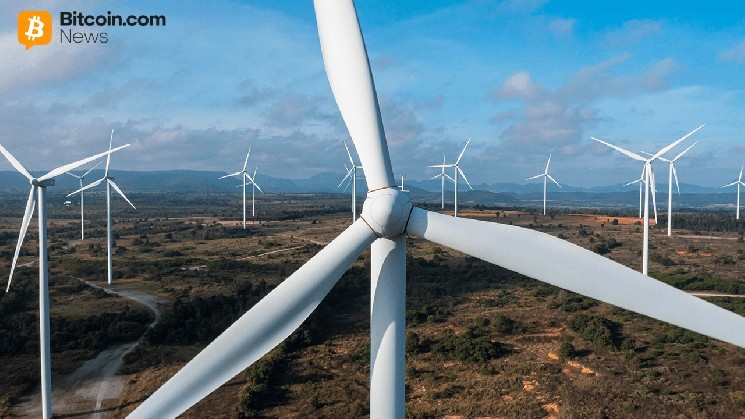Soluna and Canaan Forge Strategic Partnership to Deploy Wind-Powered Bitcoin Mining Operation in Texas
Renewable Energy Meets Cryptocurrency: A Landmark Hosting Agreement for the Digital Age
In a significant development that underscores the growing intersection of renewable energy and cryptocurrency mining, Soluna Holdings (NASDAQ: SLNH) and Canaan Inc. (NASDAQ: CAN) have entered into a substantial hosting agreement that promises to reshape the landscape of sustainable bitcoin mining operations. The partnership, announced on Tuesday, will see the deployment of 20 megawatts of Canaan’s Avalon A15 XP bitcoin miners at Soluna’s wind-powered Project Dorothy site in Briscoe County, Texas. This strategic collaboration represents a major step forward in the industry’s ongoing efforts to address environmental concerns while expanding computational capacity in North America.
Behind the Partnership: Strategic Advantages for Both Companies
The agreement enables Canaan to position approximately 1 exahash per second (EH/s) of computing power at the Dorothy facility, which primarily utilizes behind-the-meter wind power with grid backup capabilities to ensure continuous operations. This dual-source energy approach provides crucial reliability while maximizing renewable energy usage. For Soluna, a developer specializing in renewable-powered data centers, the partnership brings additional utilization to its Dorothy campus, enhancing operational efficiency and revenue streams. Meanwhile, Canaan, a leading manufacturer of high-performance computing solutions listed on Nasdaq as CAN, gains valuable North American capacity for its Avalon line of miners, expanding its global footprint in a key market.
Industry analysts note that this arrangement follows the traditional hosting model, with Soluna providing the infrastructure and energy solutions while Canaan supplies the specialized mining equipment. What sets this partnership apart, however, is the scale of deployment and the innovative approach to energy sourcing. The companies have indicated that installation will commence in the first quarter of 2026, giving both parties adequate time to prepare for the significant technical and logistical requirements of the operation.
The Dorothy Project: A Model for Sustainable Digital Infrastructure
The Dorothy complex represents a cutting-edge approach to digital infrastructure, featuring modular design elements that can accommodate both bitcoin mining operations and artificial intelligence computing needs. This flexibility allows Soluna to maximize the utility of its investment in renewable energy infrastructure while adapting to evolving market demands. The project’s location in Briscoe County places it strategically within Texas’s expanding renewable energy corridor, taking advantage of the state’s favorable regulatory environment and abundant wind resources.
Environmental sustainability experts have highlighted that this type of behind-the-meter arrangement, where energy is consumed at or near its production site, significantly reduces transmission losses and grid congestion issues that often plague traditional power distribution systems. The project’s ability to fall back on grid power when necessary also addresses one of the primary criticisms of renewable energy—intermittency—by ensuring that operations can continue uninterrupted regardless of wind conditions. This hybrid approach may serve as a model for future developments in the cryptocurrency mining sector, which has faced increasing scrutiny over its environmental impact.
Expanding Operations: Soluna’s Growing Texas Presence
The Canaan hosting agreement comes on the heels of Soluna’s August announcement regarding a significant partnership with Galaxy Digital, which will deploy 48 megawatts of bitcoin mining equipment at Soluna’s Project Kati 1 in Texas. That deployment will bring the Kati facility to its full 83 MW capacity, demonstrating Soluna’s commitment to rapid expansion in the Lone Star State. Company officials have emphasized that the Canaan hosting agreement is entirely separate from the Galaxy Digital arrangement, focusing specifically on the Dorothy site and representing an additional growth vector for the company.
This strategic expansion occurs against a backdrop of volatile market performance for Soluna. While shares of SLNH have declined more than 15% over the last five trading sessions, the stock has demonstrated remarkable strength over a slightly longer timeframe, surging by an impressive 422% since last month. This dramatic increase reflects growing investor confidence in Soluna’s business model and expansion strategy, particularly as the cryptocurrency market continues to mature and institutional interest in bitcoin mining operations intensifies.
Technical Specifications and Future Outlook
The technical aspects of the partnership highlight the advanced nature of the planned deployment. Canaan’s Avalon A15 XP units represent some of the most efficient bitcoin mining hardware currently available on the market, designed to maximize computational output while minimizing energy consumption. These units will operate within Soluna’s modular infrastructure at the wind-powered campus, creating a system optimized for both efficiency and reliability. The companies have indicated that the first mining rigs are expected to arrive ahead of the planned 2026 operational start date, allowing for thorough testing and optimization before full-scale deployment.
Looking toward the future, both Soluna and Canaan have emphasized their commitment to developing sustainable approaches to cryptocurrency mining. The partnership represents a significant investment in infrastructure that bridges renewable energy production with high-performance computing, potentially setting new industry standards for environmental responsibility. As regulatory scrutiny of cryptocurrency mining’s energy consumption continues to increase globally, partnerships that prioritize renewable energy sources may become increasingly valuable from both operational and compliance perspectives. The Soluna-Canaan collaboration demonstrates how industry leaders are proactively addressing these challenges while positioning themselves for long-term growth in an evolving digital economy.
The Broader Implications for Sustainable Cryptocurrency Mining
This partnership between Soluna and Canaan exemplifies the cryptocurrency mining industry’s ongoing transformation toward more sustainable practices. By leveraging wind power as the primary energy source for bitcoin mining operations, the companies are directly addressing one of the most persistent criticisms of cryptocurrency: its carbon footprint. The 20-megawatt deployment represents a significant commitment to demonstrating that large-scale mining operations can be conducted in environmentally responsible ways without sacrificing performance or reliability.
Industry observers note that this type of arrangement may become increasingly common as mining companies face mounting pressure from investors, regulators, and the public to reduce their environmental impact. The combination of renewable energy with strategic grid access provides a template for how mining operations can maintain continuous uptime—a critical requirement for profitability—while still prioritizing clean energy sources. As the bitcoin mining sector continues to mature and consolidate following the most recent halving event, partnerships that emphasize sustainability while maintaining operational excellence may distinguish the industry leaders from competitors stuck in outdated operational paradigms.
For communities in regions like Briscoe County, these developments bring economic benefits through job creation and infrastructure investment, while also supporting the expansion of renewable energy capacity. The ripple effects extend beyond the immediate parties involved, potentially accelerating the broader energy transition by creating stable demand for wind power and other renewable sources. As Soluna and Canaan prepare for the 2026 launch of this significant project, their collaboration stands as a testament to how technological innovation and environmental responsibility can align to create value in the rapidly evolving digital economy.















